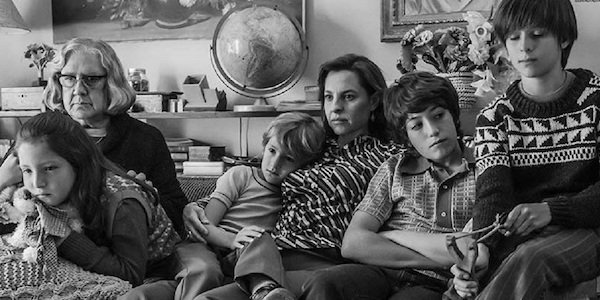How Netflix Can Improve The Theatrical Experience, According To Alfonso Cuaron

Your Daily Blend of Entertainment News
You are now subscribed
Your newsletter sign-up was successful
It's a debate being waged by theatrical purists, and it's not expected to be settled any time soon. How can industry folks support Netflix releases if they aren't being given a proper theatrical distribution before hitting the streaming service? Yet, as prestige filmmakers like Joel and Ethan Coen, Paul Greengrass and Alfonso Cuaron continue to take their talents to Netflix, the streaming giant is figuring out ways to get these new releases a theatrical window (especially when the movies have awards aspirations).
During a recent New York City screening of his new film Roma, Alfonso Cuaron conducted a Q-and-A with select journalists and spoke openly about the fight to ensure that this movie would get a theatrical window before hitting Netflix. More on that in a moment. But it was when he opened up about Netflix and the changes they can bring to the theater, we found these comments to be revolutionary, as Cuaron explained:
I believe in the theatrical experience. I love it. I went to keep on having that huge experience. Also, at the same token, I recognize when you're talking about, I'm doing a film that has a Mexican cast. ... When we went into a conventional way of offering this film, everybody was interested. But then, [we'd add wrinkles like] 'Oh, it's in black and white?' So you have to understand, 'It's in Spanish...' [laughs]And when I spoke with Netflix, it was as if they were talking about the film without the filtering of these sorts of things. And in a time that we're talking so much about -- because it's an important discussion, the whole thing of theatrical, because I think we need to defend theatrical. I think we need to protect and preserve that great experience. But there's a discussion that people are talking about diversity, because the theatrical has become a very gentrified experience, in which there's a lack of the world at large represented on the screens.
These aren't the words of a first-time director fresh out of film school trying to get his experimental arthouse picture onto the big screen. Alfonso Cuaron arguably should be at the height of his power, coming off of a Best Director win for his last film, 2013's Gravity, in which he pushed the envelope of technical achievement and white-knuckle storytelling on the IMAX screen.
And even when he brought a deeply personal and, yes, unconventional project around to studios, he saw what he describes as that "filter" that pops up. He doesn't elaborate, but you can assume what was said by nervous executives with tight purse strings. Who will be the marketable star of Roma? It needs to have subtitles? Why can't you film in color?
When Alfonso Cuaron took his project to Netflix, he was met with an openness not found at the major studios nowadays, and he saw an opportunity to bring needed diversity to the movies that are making their way to theaters. Roma is nothing if not diverse, set in Mexico City in 1970 and '71, and following a family (modeled after Cuaron's) who suffers highs and lows over the course of a year.
But at the same time, Cuaron knew that working with Netflix meant that he had to fight tooth and nail to secure a theatrical release for Roma, because he filmed on 65mm film, and he uses Dolby Atmos sound as a character in the film (for real, the sound of water is an actual presence in the movie that's important to the result).
So far, it has been an uphill battle. Netflix can't work with the major theater chains of AMC or Regal, for they seek 90-day windows of exclusivity before a movie plays on Netflix.
Your Daily Blend of Entertainment News
Negotiations with major indie chains like the Alamo Drafthouse recently hit a snag because, according to sources at Business Insider, Netflix asked for too much to ensure that Roma would be shown in the best possible conditions (biggest house, 70mm projector, Atmos sound) for a four-week window.
But the wheels are turning on Netflix movies making their way to theaters when prestige directors demand it, and a year ago, we weren't even having this discussion. So long as filmmakers like Alfonso Cuaron continue to push the envelope of the type of content that can be screened -- and Netflix works with theaters to get these features in front of audiences -- then this model can increase the level of diversity that used to be accepted, and recently has been washed away.
There's a flip side to this conversation, which shows that in the moment, there's no right answer. For while Alfonso Cuaron was busy defending the theatrical experience, and the need for the movie to play in a multiplex before hitting Netflix, his incredibly gifted leading lady, Yalitza Aparicio, was telling us that she needs the movie -- her debut performance -- to hit TV so her family can see it. She explained:
It's important because I think for people like the people that live in my community, we don't have the capability or the time to travel three hours to the main city, to the capital city, to a movie theater to see [Roma].
And you KNOW that Alfonso Cuaron wants that audience to be able to appreciate not just the performance of his leading lady, but that of his entire cast. Roma arguably was made for them, though the experiences in the movie are universal. If not for Netflix, there's a good chance this community might never see the film.
This is the give-and-take currently powering the swirl around the release of Roma, a movie that we fully expect to contend all season as we wade through the Oscar conversation. At the moment, I have no clue what movie would come close to beating Roma for Best Cinematography. Also, Roma (in my humble opinion) has incredible shots at nominations for Picture, Director, Actress and numerous technical Oscars.
And it should be seen on the biggest screen possible.
Look for Alfonso Cuaron's Roma in a theater near you when it begins screening later this month. Later, it will hit the streaming giant of Netflix on December 14.

Sean O’Connell is a journalist and CinemaBlend’s Managing Editor. Having been with the site since 2011, Sean interviewed myriad directors, actors and producers, and created ReelBlend, which he proudly cohosts with Jake Hamilton and Kevin McCarthy. And he's the author of RELEASE THE SNYDER CUT, the Spider-Man history book WITH GREAT POWER, and an upcoming book about Bruce Willis.
